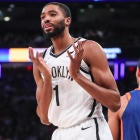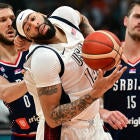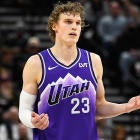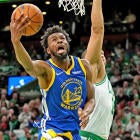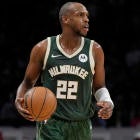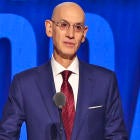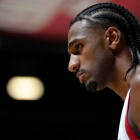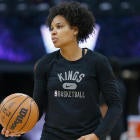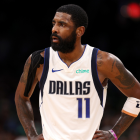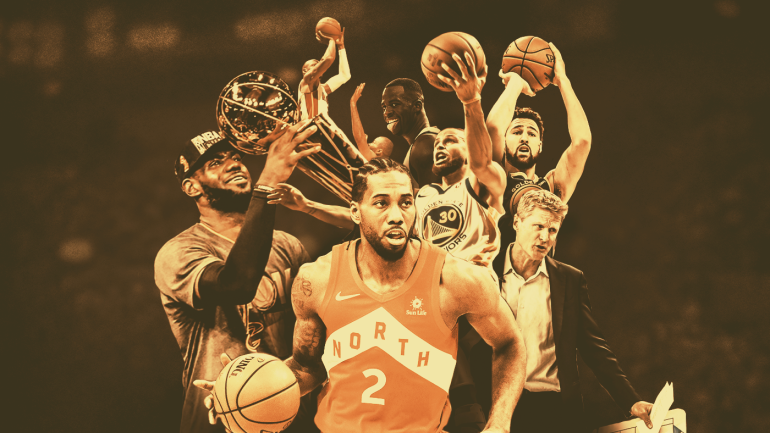
On Tuesday night, I caught up with all-time great Dominique Wilkins down in Miami. He's the color analyst for the Atlanta Hawks, who were in town to play the Miami Heat. I asked him the same simple question I've been asking a lot of people around the league: Who is the player of the decade: LeBron James or Stephen Curry?
"Oh man, that's a tough one," Wilkins said. "I think you have to go with LeBron. Eight straight Finals, and he did it for longer than Curry. It's close, but to me, LeBron did it for longer. Simple as that."
A few minutes later, I asked a prominent media member the same question.
"It's LeBron, man," he said. "You go to eight straight Finals, I don't give a damn about anything else."
Said an Eastern Conference scout: "I would say LeBron. I'm a big supporter of Steph, but I just think what LeBron does as an all-around player. He was so good at the beginning of the decade, already one of the greatest ever, really. And when you think about it, he's actually gotten better as the years went on, even now into, what, his 17th season? He's become a better 3-point shooter. You just look at him as a passer, as a scorer, as a guy who can defend any position. Curry has been unbelievable, don't get me wrong. He changed the game, no question. But I still give the edge to LeBron."
I have to admit, I was genuinely surprised by this -- not that a lot of people I asked chose LeBron, but that every single one of the 20-plus people I asked chose LeBron. Everyone prefaced their answer by saying what a tough question it was, but in the end, not one person picked Curry -- who obviously had an all-time five-year run highlighted by a record-breaking 73-win season, a scoring title, three championships and two MVPs, including one by the only unanimous vote in history.
I figured LeBron would get the majority of the votes. But for Curry to not get a single one says a lot, both about the unending, and obviously deserved, respect that people in the league have for LeBron, and also about the reluctance that still exists to put Curry alongside the greatest players ever.
"I think there is some of that," one Western Conference exec said. "I think we're still just kind of getting used to basketball in the Curry era, you know with all the 3s and running and gunning. The way LeBron dominates, that's still more familiar. That's not taking anything away from either of them."
So who would you take?
"LeBron," the exec laughed. "He's the best player I've ever seen."
Said an Eastern Conference GM: "It's certainly between those two. From a pure individual standpoint, historically I think LeBron is going to go down as the best player of this decade. I think Steph's association with the Warriors and the success they had makes it a fair question who will be remembered more, but that's probably a different question. Individually, LeBron would be my pick."
In terms of championships, both LeBron and Curry won three. Personally, I would argue Curry's 2015-16 unanimous MVP season when he hit 402 3-pointers was a higher peak than LeBron ever reached, although 2012-13 LeBron was pretty ridiculous. A lot of people I talked to agreed with Curry having a higher single-season peak. But -- and this is a significant but -- LeBron beat Curry in the Finals that season, foiling Golden State's 73-win record.
That 2016 title probably swings the vote for LeBron. If the Warriors win that title and finish off the 73-win season, it would be pretty tough to go against Curry, who would then have four championships to LeBron's two during the decade. But LeBron coming back to win that title, down 3-1 to maybe the best team of all time, ending the drought in Cleveland, just the whole thing. That's the stuff out of movies. Every championship is special, but that one was magical. Breathtaking.
As far as the eight straight Finals appearances for LeBron, that's crazy, no question. But to me, conference imbalance has to be considered. Given the West's appreciable superiority over the East during this decade, especially during the last half, Curry's five straight Finals appearances, in my mind, are the equivalent of LeBron's eight straight in the East. Factor in three titles for each of them, and from a pure winning-at-the-highest-level standpoint, it's a wash.
After that, LeBron wins pretty much every head-to-head category.
- League MVPs: LeBron 4, Curry 2
- Finals MVPs: LeBron 3, Curry 0
- All-Star appearances: LeBron 9, Curry 6
- First-team All-NBA selections: LeBron 9, Curry 3
- Scoring titles: Curry 1, LeBron 0
Indeed, LeBron has been the better player for longer. Curry's influence on the game, at all levels, is a real factor, but the simple truth is that LeBron has a strong case as the greatest player to ever live and the bulk of that case was built during this past decade. So he wins by a margin about as slim as those 2016 Finals.
And with that, let's get on to the rest of the All-Decade Awards.
Team of the Decade: Golden State Warriors
From 2015-19, the Warriors went to five consecutive NBA Finals, a feat last accomplished by the Boston Celtics, who went to nine straight NBA Finals spanning the late 1950s and most of the 1960s. Important note: There were between eight and 10 teams in the entire league during that stretch. For all intents and purposes, in terms of pure consecutive Finals appearances, what Golden State did over the past decade is unprecedented.
In the historical debate, this decade's Warriors, at least on paper, probably fall short of best team ever. They didn't three-peat like Jordan's Bulls (twice) or the Shaq-and-Kobe Lakers. Magic Johnson's Lakers went to eight Finals in the 1980s (though never five straight) and won five championships. The Spurs won three titles in five years from 2003-07.
But again, speaking only to this past decade, the Warriors are the clear winner. Three titles. An NBA-record 73 wins in 2015-16. The only team on the same ledger is the Big 3 Miami Heat, who went to four straight Finals and won two championships during LeBron James' South Beach tenure. But that's a distant second. Few things in sports are undebatable, but this is one. The 2010s were, and forever will be, the decade of the Warriors.
Coach of the Decade: Steve Kerr
The year before Steve Kerr was hired, the Warriors were a 51-win sixth seed that lost in the first round. In Kerr's first season, with the same core roster, the Warriors won 67 games and the NBA championship. Don't ever let anyone tell you coaching doesn't matter in the NBA.
Just about every move Kerr made in the early part of this Dubs dynasty came up roses. He changed the iso-heavy offense preferred by his predecessor Mark Jackson, shifting the priority to ball and player movement and, as a result, easier off-ball looks for Stephen Curry -- who, not coincidentally, won consecutive MVPs in Kerr's first two seasons at the helm.
Kerr moved Andre Iguodala to the bench. He founded the Death Lineup with Draymond Green at the five. His lineup and defensive adjustments saved the Warriors in the 2015 series against the Memphis Grizzlies, and put them over the top in their first Finals win over Cleveland. Then Kevin Durant came and Kerr made blending a superstar into an already-championship-proven team look easy.
A lot of that was Curry's willingness to welcome Durant, and in some ways take a backseat to him, but Kerr was presiding over it all. Yes, there were a few bumps in the road. But not many. Kerr is one of just three coaches to win three championships in his first four seasons. He's also the fastest coach in history to reach 300 career victories. All told, the Warriors have played in five straight NBA Finals -- and counting -- under Kerr's stewardship.
Shot of the Decade: Ray Allen, Game 6
I recently put out my take on the 10 biggest shots of the decade, and I'll say here again what I already said there: Choosing between Allen's corner 3 in the waning seconds of Game 6 in the 2013 Finals and Kyrie Irving's dagger to beat the Warriors in Game 7 of the 2016 Finals is impossible. Everyone has their opinion, and there's no way to say either side is wrong, or right for that matter.
But I'm going with Allen.
My rationale is pretty simple: When Kyrie hit his shot, the game was tied. When Allen hit his shot, the Heat were DOWN three. Kyrie misses, the Cavs are still playing. Allen misses, the Heat are dead.
"Our [family] seats are right under the basket on the Ray Allen end of the court," Heat play-by-play announcer Eric Reid told CBS Sports. "The year before, my wife had sat in those seats with her mom when we won the championship [against OKC]. So a year passes and in that year, my wife's mom passes away. So here it is 2013, Game 6, and we're down five and it's not looking good, and my wife closes her eyes and is just kind of thinking about her mom and being in those seats a year ago. And she only opened her eyes when she heard the roar of the crowd from Ray Allen's shot."
So many things about this shot were so close to being different. For starters, had Kawhi Leonard made both free throws on the other end, the Spurs would've been up four, but he missed one to keep the lead within one possession. Then, knowing Miami was going to be in search of a game-tying 3-pointer, Gregg Popovich subbed out Tim Duncan for Boris Diaw during Leonard's free throws, with the idea being that a smaller lineup could switch everything and keep Duncan from having to guard out on the perimeter.
But Duncan is one of the greatest rebounders of all time, and sure enough, after LeBron missed a potential game-tying 3-pointer, Chris Bosh grabbed one of the biggest offensive rebounds in history and kicked it out to a backpedaling Ray Allen, who is just an obsessive enough preparer that he had actually worked on this exact shot -- backpedaling to the corner off a miss and offensive rebound -- for years.
Think about all that. Kawhi misses a free throw, Duncan gets subbed out, Bosh gets a rebound, Allen, on sheer feel for the court and a near genius-level memorization of the number of steps necessary to reach the corner (in the tiniest of NBA-court nooks between the 3-point line and the sideline), retreats into position and releases in a split second. And this is to say nothing of making the actual shot. Three defenders rushing at him. A championship on the line. And again, Miami was losing. Shooting a shot like that when the game is tied and when you're losing are two completely different things.
And now consider the fallout. Had Allen missed that shot, the Big 3 super-team that was supposed to win "not one, not two, not three, not four ..." but like a hundred titles, would've actually only won a single championship in four tries. As it was, they won two titles, which is a lot different than one for a team that tried to stack the deck as the Heat did.
In fact, let's take it back to the 2016 Kyrie shot in Game 7. That's another title that could've eluded LeBron without the heroics of a teammate. It's not to take anything away from LeBron, who was extraordinary in both those series. It's just a reality: Had Kyrie and Allen missed two of the most pressurized shots in NBA history, LeBron would be, at best, 2-7 in career NBA Finals, and possibly 1-8 depending on how the last minute of that Golden State game would've played out with the game still tied at 89.
And that, right there, is the minuscule difference between Irving's shot and Allen's shot. Had Irving missed, we don't know that the Cavs would've lost. Had Allen missed, we KNOW the Heat would've lost. That's enough, barely, to get the No. 1 nod.
Play of the Decade: The Block
In a decade of NBA basketball defined by turbocharged offense and a 3-point revolution, personally, I find it to be pretty awesome that the signature play came on defense. LeBron's chase-down block on Andre Iguodala in Game 7 of the 2016 Finals is etched in NBA lore, the defensive equivalent of Jordan's hanging-follow-through dagger to beat the Jazz in the 1998 Finals.
"LeBron is going to be remembered for a lot of things, but he made the chase-down block a thing," a Western Conference coach told CBS Sports. "Him making that play on that stage was unbelievable, and I do think it won them that championship. You watch the last half of that fourth quarter. Nobody could buy a bucket. It felt like whoever got the lead first was going to win."
Indeed, the final five minutes were about as tense as a sporting event can get. The score was tied 89-89 with 4:39 to play, and from that point forward, nobody scored until Kyrie broke the tie with 53 seconds to play. But there would've been no tie to break without the block. Had Iguodala finished that layup, Golden State would've been up two with just over 1:30 left in regulation. Who knows how it would've finished out. Maybe Kyrie hits the same 3 to win by one.
But that's not what it felt like at the time, and it's not what it feels like now. That block, to the coach's point above, felt like it won the game, and ultimately, the championship. All the momentum would've been in Golden State's corner if it had taken the lead in the final minutes. The building, already on fire, would've exploded. And as mentioned above, Kyrie taking that shot down two is far different than him taking that shot with the score tied.
It was just such a fitting play for a guy who did absolutely everything in his power to carry the Cavs in those first two Finals against the Warriors. When LeBron collapsed onto the floor and broke into tears when the final buzzer sounded, that was real. He was spent, physically and emotionally. That block said everything about LeBron's absolute refusal to give up against an all-time great team. He was so brilliant in those first two Finals against Golden State. I mean, he was brilliant in every series, but those two in particular. But it will forever be this play that stands out over everything.
Also, shout out to JR Smith for making Iguodala double clutch.
Best Draft Pick: Draymond Green
Sticking with the Warriors theme, Green was taken No. 35 overall in 2012, capping a pivotal draft for the Warriors that also included Harrison Barnes and Festus Ezeli. But Green was the money pick. Absolutely nobody could've predicted Green would turn into this kind of player, but the Warriors saw something, and it landed them arguably the best defensive player of a generation as a second-round afterthought.
There were a lot of great value picks in this decade. Giannis Antetokounmpo, an MVP, went No. 15 in 2013. Two years earlier, Kawhi Leonard also went No. 15 to the Pacers, who promptly traded him to the Spurs. If you believe Leonard was the best draft pick of the decade, I won't argue with you. He's a better player than Green. I would only point out that the team that drafted him (effectively), the Spurs, only won one title with him in uniform.
Golden State, on the other hand, won three with Green. And in the opinion of Travis Schlenk, who is now the president and GM of the Hawks but back then was working in the Warriors' front office, none of those championships would've happened without the guy the Warriors drafted in the second round.
"You can talk about Steph becoming a star and Klay [Thompson] and what Steve Kerr did for the offense, you can talk about all that. But if [the Warriors] don't draft Draymond Green, none of this happens," Schlenk told CBS Sports. "That's something that nobody ever really talks about, just with everything that had to happen just for Draymond to get his shot.
"I can remember clear as day, Bob Myers and I sitting in Steve Kerr's office after we'd hired him, and Steve was going over the list of players and who he saw getting minutes," Schlenk continued. "Bob and I both asked: 'How are you going to play Draymond?' And Steve was like: 'I just don't see how we can.'
"Remember, David Lee was the starter. People always remember David getting hurt in the Denver series a few years earlier, but he was out again at the start of 2015. So the decision was kind of made for Steve. Draymond gets in the lineup. We start like 23 or 24-0 (it was 24-0) and never look back. I don't know if it's because people like David Lee or what, but that doesn't get talked about enough. That never happens with David on the court instead of Draymond."
Other irrefutably great picks were Irving at No. 1 overall in 2010 (the Cavs obviously don't win the 2016 title without him), Paul George at No. 10 that same year, Thompson, probably the second-greatest shooter ever and a three-time champion, at No. 11 in 2011, Damian Lillard at No. 6 in 2012 and Rudy Gobert at No. 27 in 2013.
But in the end, this is a race between Green and Leonard, and I give the edge to Green. Again, Leonard is the better player, but his value has been split between two franchises and still falls one title short of Green. When it's all said and done, Green could very well go down as the greatest second-round pick in NBA history.
Worst Draft Pick: Markelle Fultz
Fultz has salvaged his early career to some degree, but it has benefited the team that drafted him -- the Philadelphia 76ers -- exactly zero. In the less than two seasons they had Fultz, the Sixers got basically no production and no trade value. It's not the first time a No. 1 overall pick has flopped so early in his career; the Cavs infamously took Anthony Bennett No. 1 overall in 2013, and he proceeded to play for four different teams over the next four seasons before washing out of the league entirely.
But a couple things make the Fultz pick even worse than Bennett. For starters, the 2013 class was pretty thin. Yes, in hindsight the Cavs could've taken Victor Oladipo, who went directly behind Bennett at No. 2 to Orlando, or technically CJ McCollum (who went No. 9), Giannis Antetokounmpo (No. 15) or Rudy Gobert (No. 27). But in reality, none of those guys was anywhere close to being considered the No. 1 overall pick at the time. Had the Cavs passed on Bennett, they likely would've taken Oladipo or Otto Porter Jr.
Oladipo is really good, but there's a butterfly effect here. How does he develop next to Kyrie Irving? Oladipo had to leave Orlando before he blossomed as it was. When LeBron comes back to Cleveland in 2014, does a second-year Oladipo even stay out of the trade packages? Nobody can say for sure, but there are a lot of variables here.
With Philly and Fultz, the opportunity cost is much clearer. The Sixers originally had the No. 3 overall selection in 2018, where, had they just stood pat, they may have gotten Fultz anyway. The Celtics loved Jayson Tatum all along, and the Lakers were fixed on Lonzo Ball. Had someone else traded up with Boston to take Fultz, that would've saved the Sixers from themselves. But even if Philly still wound up with Fultz at No. 3, at least it wouldn't have had to trade a first-round pick to get him.
"That's the real kick in the you-know-what," a league exec told CBS Sports. "The draft is a crapshoot. It's not like Fultz is the first pick to not work out. But giving up another first-round pick on top of it, there's no way to spin that positive with the way it's turned out. It's just unfortunate."
The Sixers actually missed on a lot of picks throughout their Process -- Jahlil Okafor, Nerlens Noel, Michael Carter-Williams. But all of those picks were, and are, largely offset by the picks of Joel Embiid and Ben Simmons, who have given the Sixers a championship foundation.
Fultz was supposed to be the one to put them over the top. He was seen, pretty much, as a can't-miss prospect, a three-level scorer with versatile defensive size who would fit perfectly next to Simmons and as a traditional inside-out duo with Embiid. Instead, he forgot how to shoot. And now he's in Orlando still trying to remember.
Best Trade: Kawhi to Toronto
This is crazy, but both times Kawhi Leonard was traded during the 2010s would qualify as the best trade of the decade on its own. When the Spurs got him from Indiana for George Hill on draft night in 2011, that was an all-timer. But there was some luck in that, as there is with any draft-night deal when the futures of any players involved -- particularly in the middle of the first round -- are more or less a crapshoot.
When the Raptors lured Leonard from San Antonio last summer, however, they gave up one of the best players in franchise history, not to mention a fan favorite and Kyle Lowry's best friend, in DeMar DeRozan. They did so even though Leonard was seen as an almost-certain one-year rental, which he in fact turned out to be. But in that one year, the Raptors won the only NBA championship in franchise history.
That championship is the key difference between the Leonard deal and probably the most famous, or infamous, trade of the decade, which is the Celtics' 2013 heist of the Brooklyn Nets in which Boston absolutely stole four future first-round picks for an aging Kevin Garnett, Paul Pierce and Jason Terry.
Everything the Celtics have become in recent years is largely a result of that trade. One of the picks became Jaylen Brown. Another turned into Jayson Tatum. A third was sent to Cleveland in the deal that netted the Celtics Kyrie Irving -- who in the irony of all NBA ironies, now plays for the Nets. But none of this has netted the Celtics a championship, or even a Finals berth.
This category could look a lot different a few years from now. If Tatum and Brown turn into stars and Boston ends up winning a title, that Nets deal will look even better. If Anthony Davis delivers a title to the Lakers alongside LeBron, or even in the post-LeBron era, we'll be talking about that trade in a brighter light. On the flip side of that deal, perhaps Lonzo Ball and Brandon Ingram become the stars in New Orleans they were expected to be with the Lakers, and we're remembering the Davis deal for reasons unexpected.
Paul George to the Clippers is also a big one to watch.
But all these deals were executed with the hope that they would, or will, result in what the Leonard deal already provided Toronto: a championship. If it happens for any one of them, it won't be in this decade.
Biggest Disappointment: Lob City
That the trio of Chris Paul, Blake Griffin and DeAndre Jordan -- with guys like JJ Redick and Jamal Crawford and even an aged Paul Pierce eventually alongside them -- never even made it to a conference final is almost hard to believe. The Clippers were so good in these Lob City years, but they just couldn't catch a break. If it wasn't injuries it was the Donald Sterling debacle. In one of the worst all-time playoff collapses, the 2015 Clippers blew a 3-1 second-round lead against the Rockets in which they had a 19-point lead in the third quarter of Game 6.
Then, poof, the Warriors took over the world.
Now Paul, Griffin and Jordan are all gone. In their wake, they left enough come-out-of-your-seat highlights to fill a digital museum, but not enough to add up to anything too memorable, which is a shame for a team composed of at least two Hall of Famers, dead in the prime of their careers, that on any given night could look like the co-captains of the best team in the league.
Biggest What If?: 2011-12 Oklahoma City Thunder
When Oklahoma City lost to the Heat in the 2012 Finals, everyone assumed it was only the beginning, that the Thunder would be back and would eventually end up with a championship banner, if not a few of them, hanging in the rafters.
It never happened.
Like the Lob City Clippers, disappointment would be a fair word to attach to the Thunder, who never won a title despite employing three future MVPs on the same team. Even when one of the MVPs -- James Harden -- left, OKC had the Warriors down 3-1 in the 2016 conference finals and couldn't seal the deal.
But at least they were there. The Thunder made it to four conference finals in the decade, in fact, and the one Finals. The Clippers never came close to that kind of success.
So again, with the Thunder, it's more about what might have been than what never was. That 2011-12 team was a monster on the verge of world domination: Durant, Russell Westbrook and Serge Ibaka, all just entering their primes, along with Harden, who was Sixth Man of the Year that season. One can only imagine what that team could've been had it stayed together. But the Thunder chose to trade Harden to the Rockets following that Finals appearance in a deal that didn't make a ton of sense at the time, and has aged even worse.
Harden still had one year left on his contract, and in the years since the conventional wisdom has suggested the Thunder didn't think they would be able to afford Harden when his rookie deal expired in the summer of 2013. Also, there were concerns over Harden's continuing acceptance of a bench role, and whether he and Westbrook could fully blossom together. It's ironic that Houston, some seven years after trading for Harden, is now the team betting those two can bring out the best in one another.
To be fair, the circumstances are different. Westbrook is not the player he was back then. He's still really good, but he was a beast back then. Obviously Durant was, too. Also, the Heat and Celtics had already proven that three stars could come together in their primes and win championships.
If money was the problem, well, Oklahoma City isn't far removed from having a $134.5M payroll in 2017-18 and a $144.9M payroll in 2018-19, both top-three marks in the league, all for two teams that got bounced in the first round. Seems like it would've been worth it to pay for a potential dynasty.
To be fair, even if Durant, Westbrook and Harden had stayed together, It's impossible to know whether Harden would've become the player he is now and whether they would've collectively been able to make it work at the highest level.
But what if?










